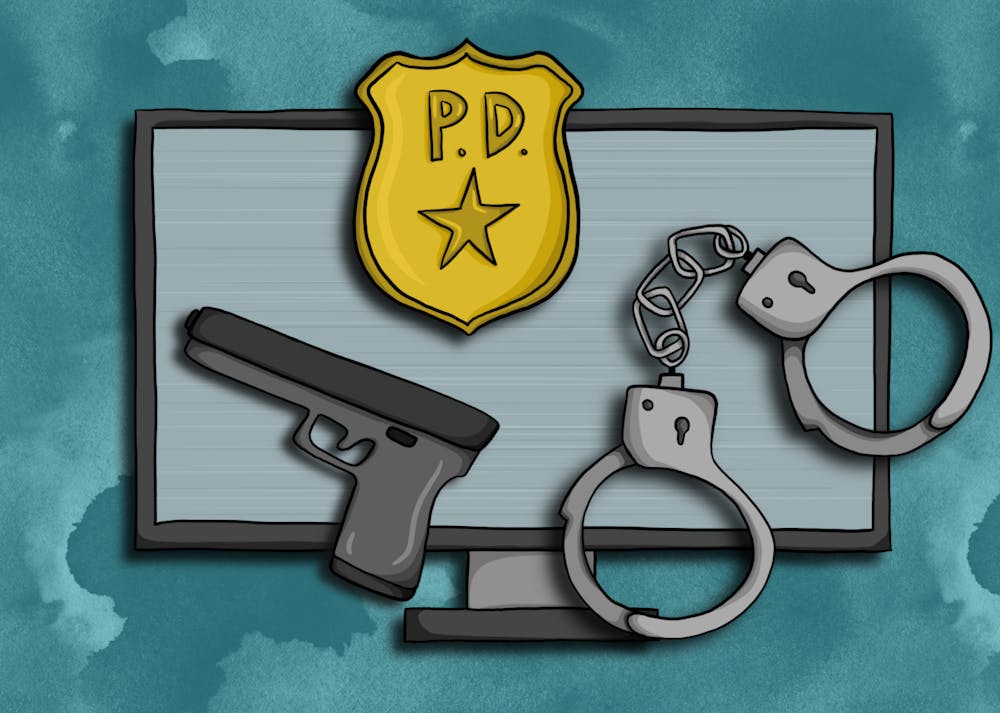Procedural cop shows are the bread and butter of American TV but have in recent years come under fire for glorifying law enforcement during a police abolition movement. As a result, cop shows have been placed under the public’s microscope.
As we begin to pick apart the scenes, writing and production of these shows many know and love, we have to wonder: is what we’re watching complex story building or just another example of Copaganda?
It’s no secret as to how shows like Law & Order: SVU and Brooklyn Nine-Nine have us binging every weeknight. The way modern-day issues like sexual assault, police brutality and racial injustices fit so seamlessly into thought-provoking, tension-filled plots is what makes shows and movies like these so successful.
But after the hours of binging and alternating between reality and fiction, people have started to notice how easily these shows mirror outside world scenarios.
Amy Dawn Shinabarger, a lecturer at the College of Interdisciplinary Sciences and Arts who specializes in discourse analysis and discourse, said there seems to be an obligation to portray police as heroes, but when networks portray their moral ambiguity in an attempt to humanize them, it creates a more relatable character for the audience.
"So we definitely see a lot of that, but we also see some realistic portrayals from the opposite side where we see police portrayed definitely as what I would say more, more realistic, but some people would certainly say it's more negative," Shinabarger said. "And the balance of those two things now too, depending on the network, depending on where it's being viewed, depending on who's saying it."
This gives the audience the impression that their favorite characters are different than the cops in real life, and should be exempt from warranted criticism.
The audience is then slated to root for the Olivia Bensons and Jake Peraltas of the world, keeping them altogether detached from the Derek Chauvins.
Gray Cavender, criminologist and professor emeritus of justice and social inquiry at the School of Social Transformation, attributes this to the format of these shows, which allows the audience into the back of a police car like a ride-along, and shows a narrative from the police's perspective.
"I think sometimes whether it's intended to be propaganda or not, even fictional programming is propaganda," Cavender said. "And so people who write the shows and these movies, sometimes they're not working for the police, but they believe in what the police are doing, and how they do it."
On the other hand, Joseph Fortunato, a principal lecturer at the Sidney Poitier New American Film School sees these portrayals of law enforcement as compelling material made up of complicated characters and dramatic conflict, rather than something with an agenda.
"You see movements being created around real people like George Floyd and such, not around TV characters or TV storylines," Fortunato said. "It's really more about when actual news items go viral and get put into the public consciousness."
He said although these portrayals have an impact on our society and culture, it is more a reflection of the real world than an influence.
“That's what storytelling is, especially in a drama, as it were, so I think having characters that are in conflict, and are challenged by their moral choices, is good storytelling. I wouldn't call it propaganda,” Fortunato said.
Audiences attach themselves to these fictional police officers on a screen, but is their loyalty still intact when they're seen on the streets? Where do audiences begin to draw the line separating reality from fiction, especially when it comes to such a controversial occupation?
"If you just see Law & Order, or you just see Criminal Minds ... and that's your only portrayal of police, you're going to of course think that's local portrayal," Shinabarger said. "But if you see that and then you also see what's going on in the media and you're paying attention to different things going on in this country and the responses from places in the world besides this country, it forces you to think about it from more than one perspective. You have to see two bits of it and come to your own conclusion.”
Film is a complex and difficult topic to pin down. It is arguably almost always up for interpretation as an audience sees fit. The fluidity of TV and movies is what makes labeling procedural police shows as propaganda so difficult.
"Beware the Trojan Horse. As long as Hollywood has white men writing screenplays, writing teleplays, running the shows, you're going to get the same stuff," Cavender said. "It ain't real. It's television, and don't ever forget that."
Reach the columnist at amvald11@asu.edu and follow @anxieteandbread on Twitter.
Like The State Press on Facebook and follow @statepress on Twitter.

Analisa Valdez is a reporter with the Echo, focusing on covering the arts and entertainment world. Analisa has been apart of the State Press for two and a half years and is in her third year at the Walter Cronkite School of Journalism and Mass Communication.




